Without a doubt, mango is one of the tastiest and most nutritious fruits in the world. As a horse farmer, you may want your horse to be able to benefit from the flavor and nutrition a mango offers.
But if you know animals well, you can expect that they do not always tolerate the same things humans tolerate.
Can horses eat mango?
Horses can eat mango, but you must take certain precautions for them to do so safely. You must always to remove the mango pit before feeding the horses because of its choking potential.
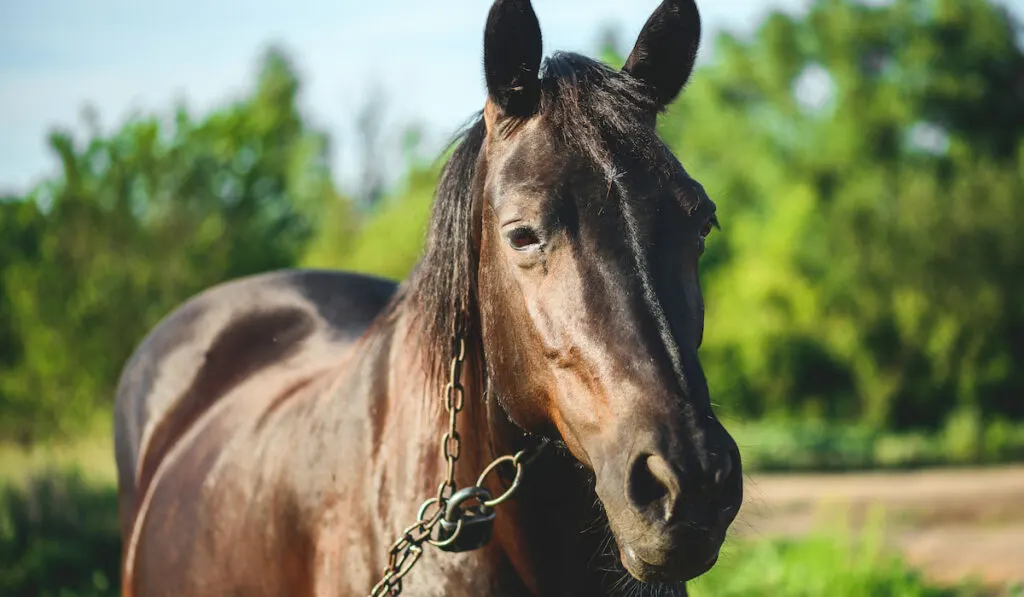
Let’s take a closer look at mangos and how your horses might benefit from snacking on them.
Table of Contents
Can Horses Eat Mango?
As long as you remove the pit before giving the mango to them, horses can each mangos with no issue.
A mango pit is thick, hard, and cannot be chewed by a horse.
If you serve your horse mangoes with the pit and they swallow it, the pit could get stuck in their throat. When this happens, the horse will start choking.
While your horse is choking, you will notice signs like excessive salivation or discharge of feed from the nose and mouth and difficulty swallowing.
You may also notice the horse trying to gag or cough out the pit or appearing to panic.
You should call a veterinarian immediately you notice any of these signs, especially after giving your horse mango without removing the pit. Early intervention by a professional will prevent severe complications.
What Parts of a Mango Can Horses Eat?
Skin
Horses can eat mango skin especially when the mango is ripe.
Mango skin contains significant levels of antioxidants (such as carotenoids). It also contains fiber, Vitamin E, and Vitamin C.
Flesh
Horses can eat mango flesh. The flesh of a mango is the sweetest, most nutritious, and juiciest part of a mango. They make a great treat option for horses.
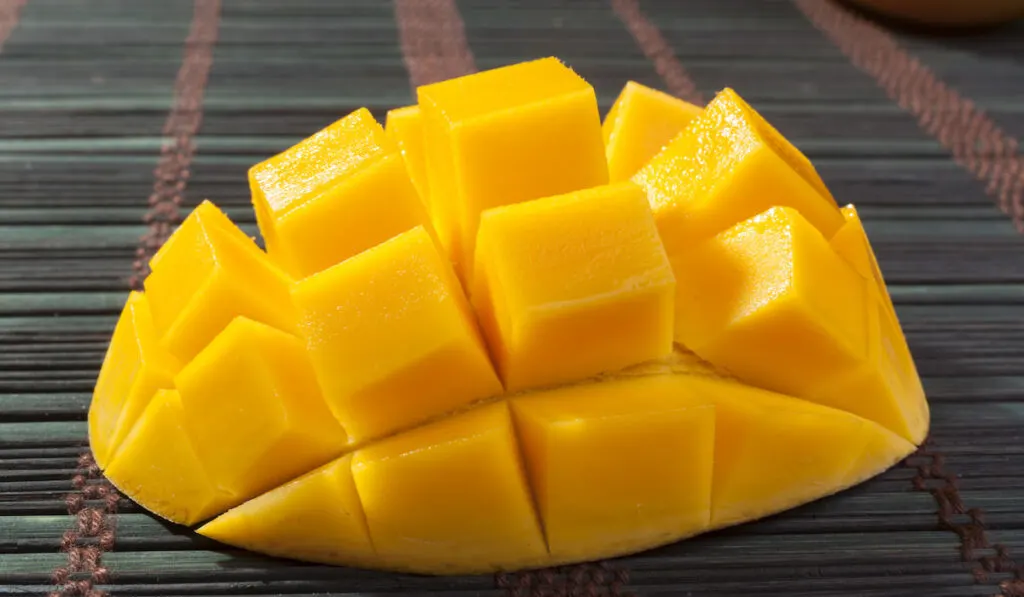
Whole Mango
You should not give horses a whole mango since this will contain the pit. As you now know, mango pits are a choking hazard to horses.
How Many Mangoes Can Horses Eat?
There is no standard on the number of mangoes horses can eat. However, horses should be able to safely eat mangoes in moderation.
Horses should be fine if they consume about 500 grams of mango within 24 hours.
However, you should only give them mangoes occasionally. Regular consumption of mangoes may leave them prone to Vitamin A toxicity.
Mango Nutrition
Mangoes are actually very nutritious.
They are low-calorie stone fruits that are rich in vitamin A, vitamin C, iron, calcium, magnesium, and vitamin B6. Your horses will also get a lot of fiber from consuming mangoes.
So, how do these nutrients help your horses?
Vitamin A
Vitamin A is present in mango as carotenoids. When horses eat mangoes and get these carotenoids, they convert it to vitamin A.
Vitamin A helps maintain a horse’s healthy vision, particularly color and night vision.
It also acts as an antioxidant and helps fight oxidative stress. Vitamin A also improves immunity, fertility, fetal development, and integuments.
Horses need a maintenance dose of about 13.6 IU of Vitamin A per pound of body weight in a day.
While they’re growing or when they are at work, they need around 20.5 IU of Vitamin A per pound of body weight.
Since horses are herbivores, you should control the amount of Vitamin A they get.
Herbivores cannot detoxify Vitamin A, and too much of it can cause issues for them.
In horses, some signs of Vitamin A toxicity include skin shedding, fragile bones, and birth defects.
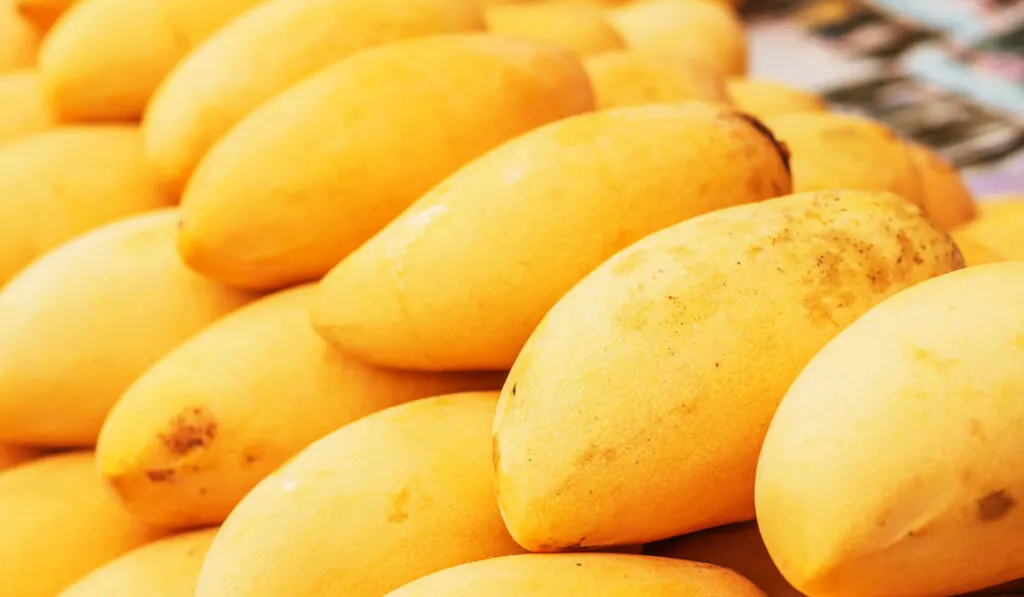
On average, a light horse weighs 1000 pounds, while a heavy horse weighs about 2000 pounds.
Therefore, at rest, these classes of horses need 13,600 IU and 27,200 IU of Vitamin A respectively.
Since a 100-gram raw mango contains about 1082 IU of Vitamin A, the chances of your horses experiencing Vitamin A toxicity from moderately eating mangoes is low.
Vitamin C
Vitamin C has antioxidant properties in horses. It helps neutralizes free radicals and mitigates the damages they cause to body tissues in horses.
Vitamin C also improves immunity and helps fight stress in horses.
While the Vitamin C can horses get from mango might be beneficial to them, they produce their own Vitamin C from glucose, so it is not an essential added nutrient for them.
Vitamin B6
Vitamin B6, also known as pyridoxine, plays an important role in protein metabolism in horses.
Since Vitamin B6 is a water-soluble vitamin, it very rare to find a case of toxicity.
Cases of Vitamin B deficiency are also uncommon. However, when they do happen, you may notice a loss of appetite in your horses.
Iron
Iron is not needed in large amounts by horses. Its main function is as raw material for the formation of hemoglobin.
Hemoglobin is the protein complex in blood cells responsible for carrying oxygen in a horse’s body.
Calcium
Calcium is essential for bone and teeth formation in horses.
Calcium is important for your horses to maintain skeletal integrity. It also facilitates nerve function, muscle contraction, enzyme regulation, and hemostasis.
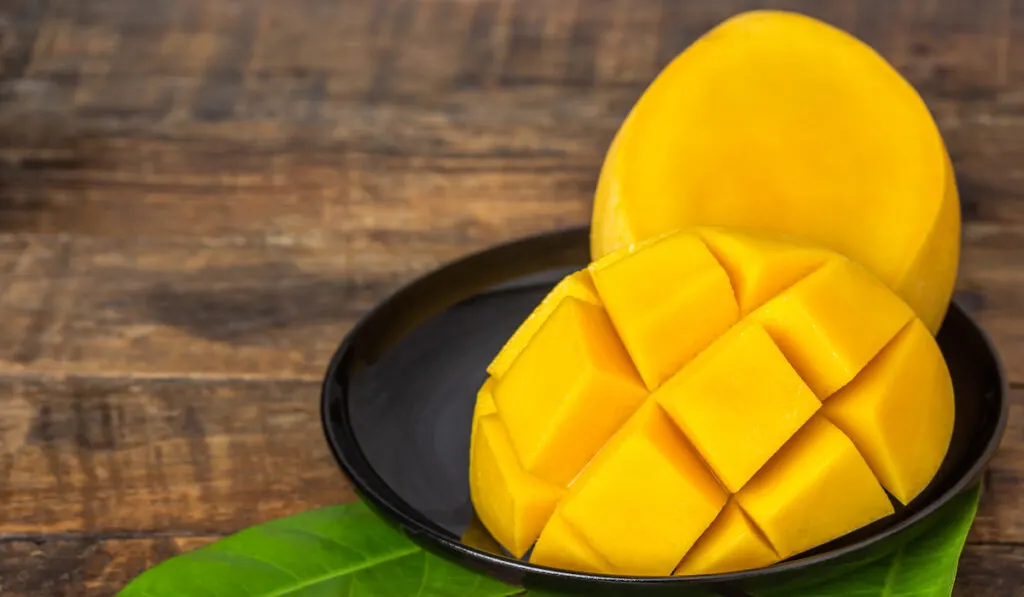
Magnesium
Like calcium, magnesium also plays a role in bone formation, nerve function, and muscle contraction.
Besides these, magnesium also facilitates enzyme regulation and electrolyte regulation.
Fiber
It is said that horses are better prepared for exacting tasks when the activity of beneficial microbes in their gut is high.
One way to improve the activity of these microbes is to provide sufficient fiber in their diet.
Fiber consumption in horses also reduces the fecal loss of nutrients, loss of electrolytes, and loss of water.
Mango Treat Ideas
If you want to change up the mango treats you give your horses, consider preparing them with one of the following recipes.
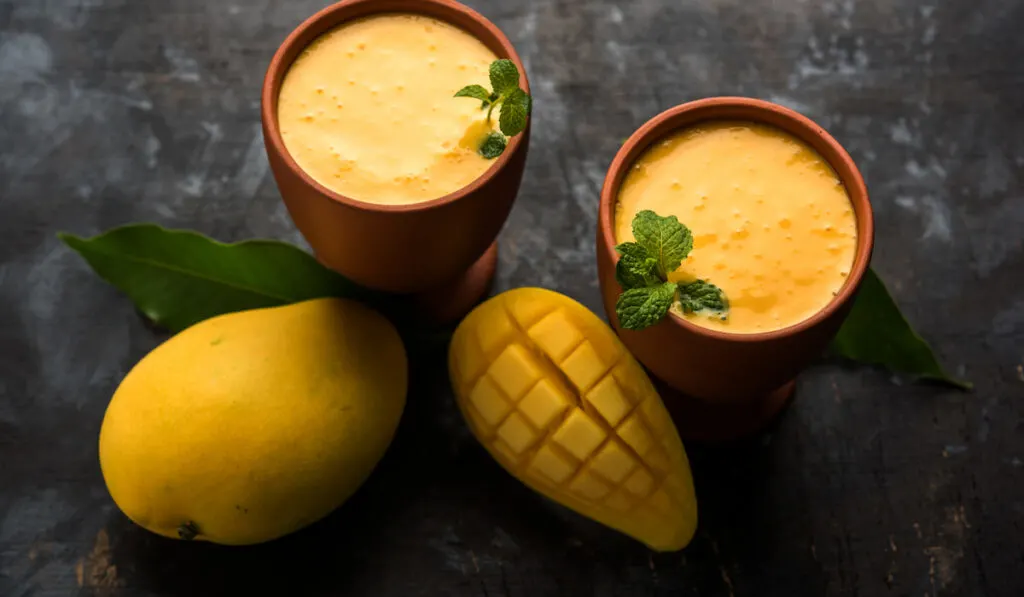
Carrot-Mango Mash
- Chop a fixed quantity of mango flesh in a bowl.
- Chop equal amounts of carrots, and add them to the same bowl.
- Stir well to mix the chopped carrots and mango flesh.
- Transfer this mixture to a food processor or blender.
- Add a little water (about 20% the volume of the carrot-mango mixture) to the blender.
- Blend the mixture for 5 minutes or until the mixture is mashed.
- You may cool in a refrigerator before serving or serve it to the horses at room temperature.
Mango in Carved Watermelon
- Wash the mangoes, remove their pits, and dice the mango evenly.
- Add the diced mangoes into a bowl.
- Cut one watermelon into half.
- Carve a small circle into each watermelon half large enough to contain the diced mangoes.
- Transfer the diced mangoes into the carved watermelon.
- Place the watermelon in a refrigerator for 20-30 minutes, and then serve the horses.
Summary
Horses can eat mangoes, but they should only eat them without the pit. A mango’s pit can get stuck in the throat of a horse, and when it does, the horse is at risk of choking.
Resources
- https://www.helpfulhorsehints.com/fruits-and-vegetables-horses-love-to-eat/
- https://thehorse.com/152276/mangoes-toxic-to-horses/
- https://vcahospitals.com/know-your-pet/choke-in-horses
- https://fdc.nal.usda.gov/
- https://thehorse.com/14015/weighing-in/
- https://www.nutritionvalue.org/Mangos%2C_raw_nutritional_value.html
- https://dressagetoday.com/blog/experts-27056
- https://thehorse.com/18405/vitamin-c-does-it-help-horses-with-inflammation/
- https://www.plusvital.com/vitamin-c-horse/
- https://www.finishlinehorse.com/index.php/2016/12/05/vitamin-b-in-horses/
- https://www.spillers-feeds.com/iron-for-horses/
- https://hygain.com.au/blogs/library/mineral-nutrition-importance-calcium-phosphorus
- https://ker.com/equinews/advantages-high-fiber-diets-horses/
- https://www.healthline.com/nutrition/mango-skin
